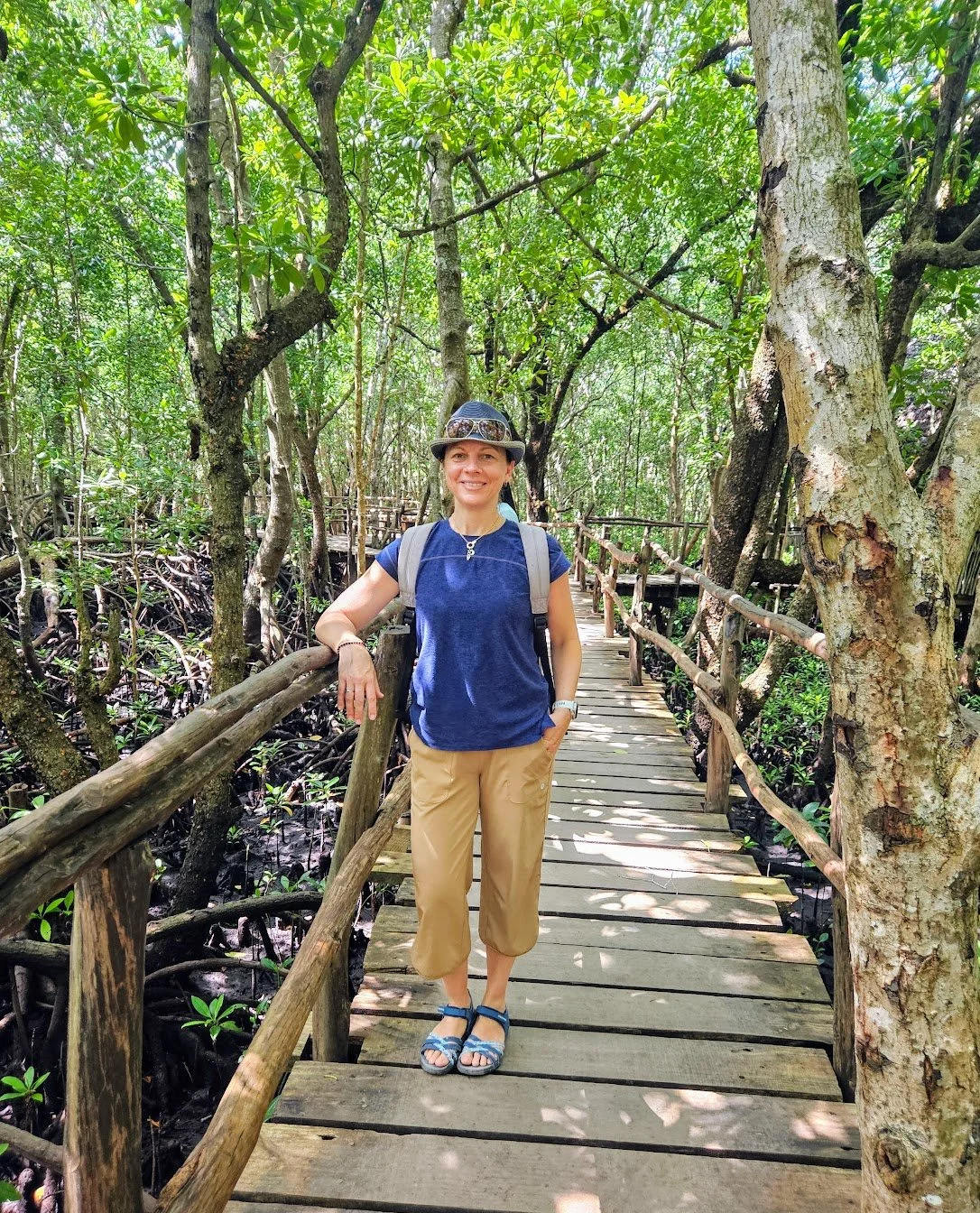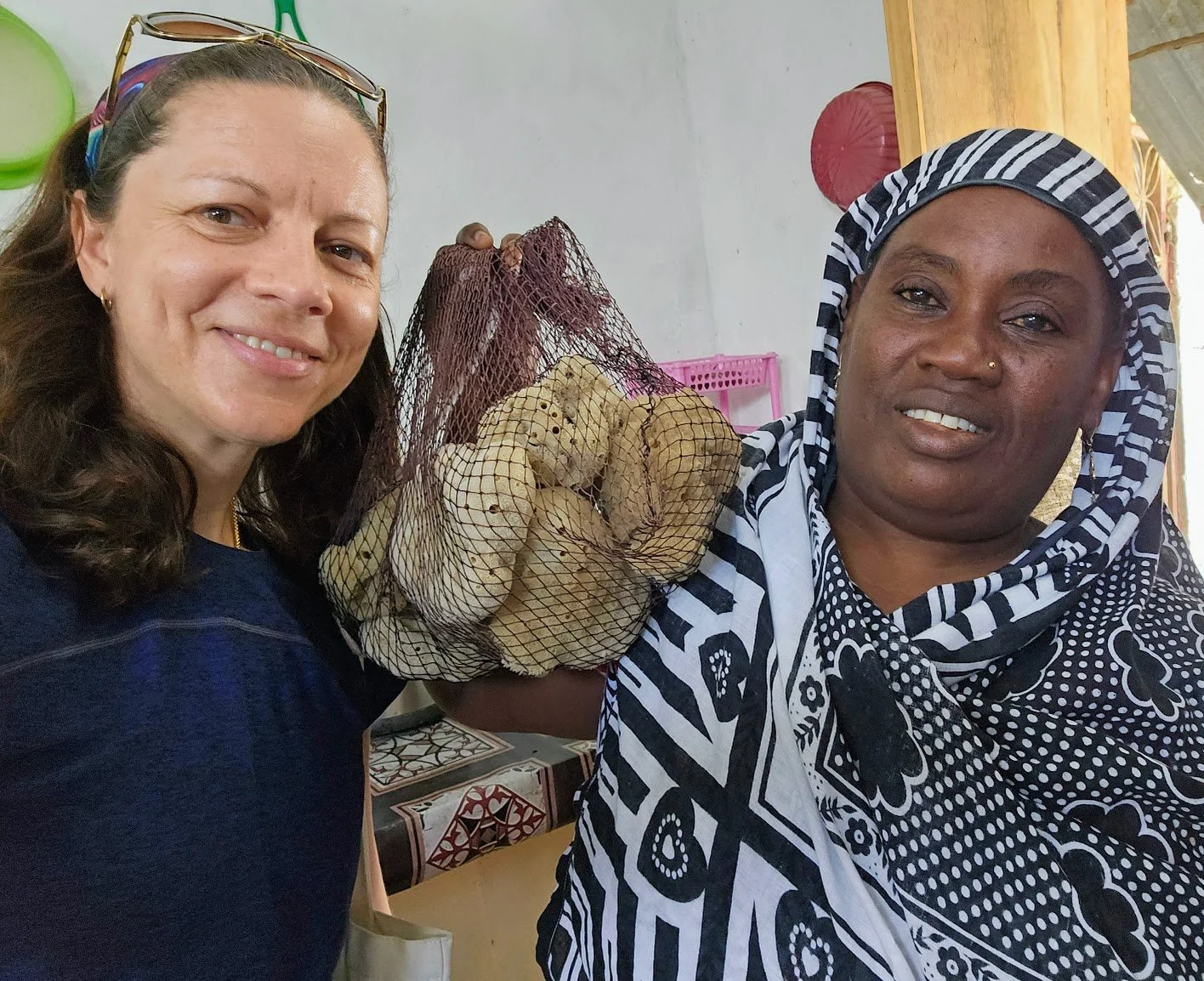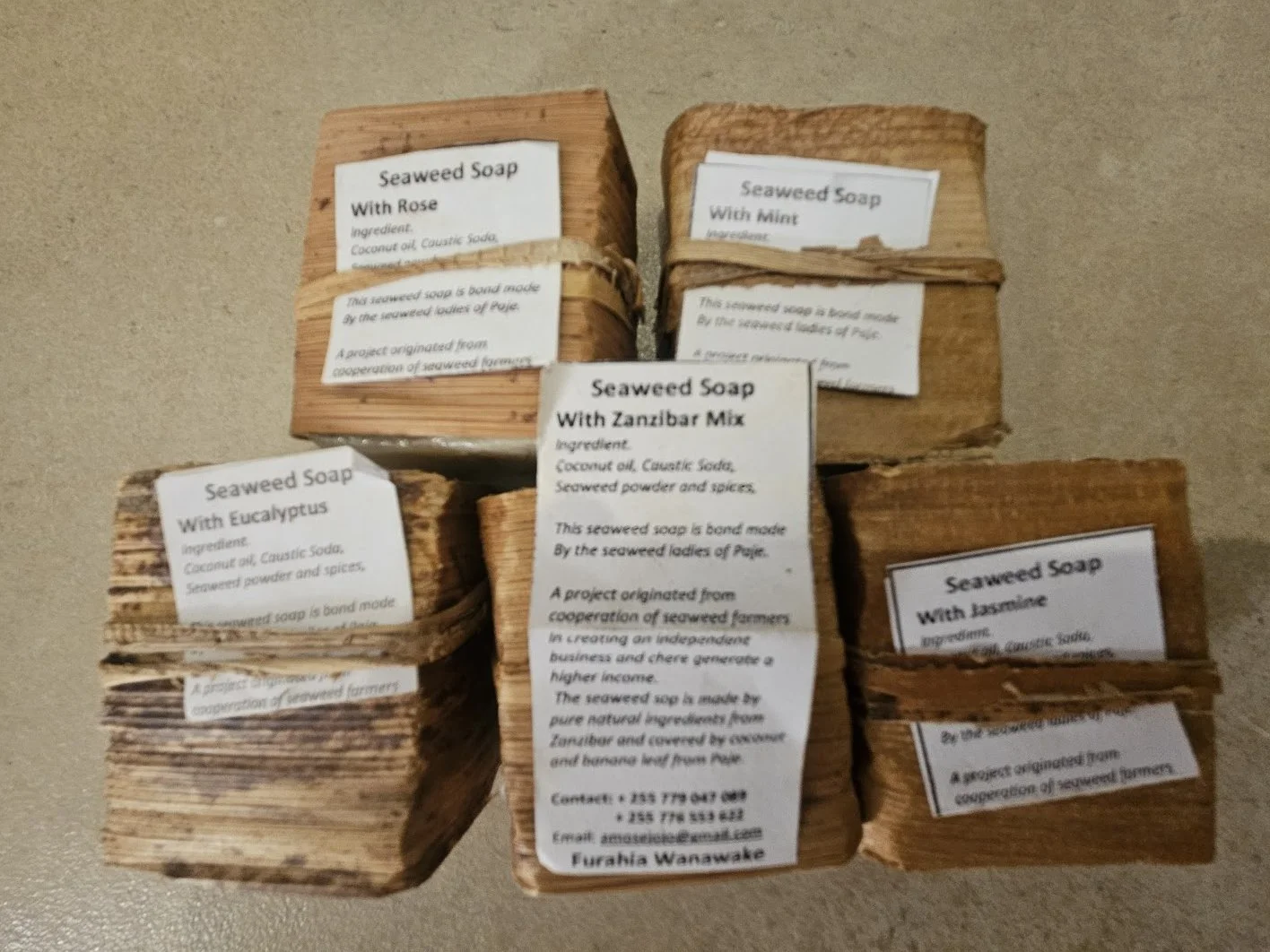Hope and the feminism of conservation
Yesterday took me from the seaside to the jungle of Zanzibar! I had a beautiful walking tour through the Jozani Forest, a conservation area that includes mangroves, monkeys, anteaters, and other amazing jungle wildlife. I got to see many Red Colobus and Blue monkeys run and jump around me in the trees, very curious and playful! More pictures and videos of them here.
It was also lovely to see the different species of mangroves on Zanzibar. I am very familiar with the 3 primary species of Florida mangroves, and it was great to see how they are related by genus to some of the 9 species of native Zanzibar mangroves. They are crucial to the local ecosystem as they hold the island sediment together with their roots and play a massive role in nutrient cycling, animal and other plant habitats, and wind resistance. They are threatened by deforestation.
Me on the mangrove walkways. Zanzibar is home to 9 native species of mangrove.
A Red Colobus Monkey in the Jozani Forest on Zanzibar.
Let me backtrack, though, to how my day started. The interview!
I met up with Okala at his restaurant about 30 minutes early, where he asked me if I had gone to any parties the night before and teased me when I responded that I’m too old for parties (truth is, I never went to any in my youth, either). He replied, “Age is nothing! You do what you want!” True thing, sir. I tend to want to go to bed by 9 pm.
On our walk to the home of the woman I would be interviewing, I asked Okala about how he knows the sponge farming women, about his life growing up on Zanzibar, and his connection to ocean conservation and eco-tourism. He told me he just wanted to protect what he knew was so important for his island and his people. This very much included women, especially single mothers, having a sustainable livelihood that gave them the independence of owning their own homes. It also meant eco-tourism. Okala brings in students and tourists from all over the world to exchange knowledge on sustainable aquaculture practices and to spread awareness of the importance of these practices; I believe this is why he is willing to work with me and my project.
We arrived at Nasir’s home, and she welcomed me with a hug. We sat on the floor of her living room, and Okala translated as I asked her a series of questions about her work. In caring for the sponges, she freedives (a Zanzibari haenyeo!) and spends about 3-4 hours a day in the water during low tide. Sponges are harvested from September through December, and the bulk of them are sold to tourist shops in the spring. She said that she feels a strong sense of camaraderie from the other sponge farming women in the community who form a co-op called Wakulima Wa Sponge Co-op. As a single mother of four children, Nasir is quite busy, as are her peers, and they depend on each other’s support. The biggest challenge in her work, she says, is climate change. She can tell that over the past 10 years alone, the sponges are suffering from bacterial infections that are only possible because of changing water temperatures. This has directly impacted how many sponges are harvested in a given season.
Me with Nasir, a freediving sponge farmer in Jambiani Beach, Zanzibar.
One of the last questions I asked Nasir: What is a source of hope for her when climate change is a threat to her livelihood?
Her answer: When there are good seasons, she feels hopeful. When there are not, she feels despair.
I had been thinking a lot about “hope” on this leg of the trip as I had been reading a book co-authored by Jane Goodall and Douglas Abrams called The Book of Hope: A Survival Guide for Trying Times. Much of the book takes a Socratic format as the co-authors muse on the definition of “hope” for what may feel like eternity to some readers. Is hope a feeling? A skill? An instinct? Jane calls it a “survival trait” and makes abundantly clear that hope is never a passive wish, but rather “requires active engagement.” For me, this rings true. I think hope is what brought me here.
But what about for Nasir? Is the farsightedness to hold onto hope beyond a single sponge season when the success of sponges equates to feeding your four children a privilege? Is hope also a privilege? Nasir perseveres, so perhaps whether she feels hope or not, her survival trait of tenacity is the kind of hope that Jane was getting at. Maybe that’s where I am chasing the meaning of “hope”, from a position of privilege to a position of necessity.
As I walked back with Okala, I asked him about how sponge farming compares to seaweed farming on Zanzibar in terms of success for the women. He said that even though seaweed farming produces greater GDP for Zanzibar, women make more in sponge farming. They can earn more per sponge by selling them at tourist stores than by creating and selling soap from seaweed. This didn’t make sense to me at first; seaweed is exported around the world, both unrefined and as soap. Sponges harvested on Zanzibar were not exported. The figures I had learned on my tour of the Mwani facility the day before suggested that seaweed would be more lucrative. Okala said that working for Mwani - a “large business” by relative standards - meant good benefits for the women, but less pay. There were other small co-ops of seaweed farming women in the area that fared better, but sponge farming was more lucrative still.
Some soaps I purchased from the Furahia Wanawake co-op of seaweed farming women in Paje, Zanzibar.
So here it is. The more corporate an operation becomes, the more wealth and power are driven away from women. I know this is a broad generalization, and yes, there are corporations run by women, and there are “good” corporations out there run by men, and so on. I know. But what I am pointing to is an overwhelming trend, especially in emerging economies, that corporations historically exclude economic opportunity for women and, by definition, exist for exploitative growth and dominance of their particular economic niche.
Am I just defining totalitarian capitalism? Yes. Am I judging the economic practices of a country on a side of the world I have nothing to do with? I might be, but that isn’t actually what I’m trying to do. In this and nearly every book she’s written, Jane Goodall lists the very first step towards change and hope in a world of destruction at the hands of humans as this: create sustainable livelihoods for people. Humans won’t stop cutting down trees, poaching endangered species, and relentlessly taking from nature if they have no other choice for survival.*
*I, for one, am not directing this toward industrial and corporate destruction caused by the United States. That’s not survival, that’s raw greed. We have many other choices for energy, for example, those that other countries have willingly taken up; we just apparently won’t do them.
What I am saying is that small-scale, community-focused work is what best supports both women and the local environment. They go hand-in-hand. Not the need for the fiction of endless growth. Not the need for dominance of an industry. In this way, conservation is a feminist movement. This is certainly not a novel concept, just one that I am cementing as verifiable from my first-hand observations. I worry that the larger a business becomes on Zanzibar, the less the women of the island benefit from it.
To be clear, it is dominance that I detest, not men. I may not have made this point lucid enough in my posts. I do not hate men. I am a mother of two wonderful sons. My sexual orientation favors men by about 70/30. There are wonderful men in my world who have helped me develop my sense of feminism throughout my adult life. What I hate is the definition of masculinity that necessitates dominance, which is necessarily violent. It gives me hope to encounter cultures that define masculinity differently (for the Maasai of East Africa, being a man means owning and herding a cow) and to see men define masculinity in their own ways; I don’t know how Okala defines masculinity personally, but I observed a man who is deeply committed to equality among those in his community and the sustainability of his natural environment.
Most of all, the women of this island give me tremendous hope. They are out in the low tide every morning gathering seaweed, both the Mwani Mamas and the co-op seaweed farmers. They smile, they go to work, and they support each other. They also put up with bright-eyed tourists like me asking them about “hope.”
One of the seaweed co-op farming women gathering seaweed in the early morning low tide.
This afternoon, I will do my final SCUBA dive on Zanzibar. Tomorrow, I fly away from the sea, concluding my research portion of the trip and my exploration of “the Sea and She”.
I have much to reflect on, and writing to begin, and will start doing so from the legendary beauty of Ngorogoro Crater on the mainland of Tanzania.
More to come from there.





